If you buy through our links, we may earn an affiliate commission. This supports our mission to get more people active and outside.Learn about Outside Online's affiliate link policy
Backcountry Brain Lets You Search the Web From Your InReach. But Does it Work?

(Photo: Eric Raptosh Photography via Getty Images; Emma Veidt)
I wouldn’t call myself an AI zealot. I’ve never used it to get restaurant recommendations, generate a meal plan, or write an email for me. Before you call me a luddite; I’ll say I do see situational value in it. I have certainly benefited from AI-based transcription services at work and have been delighted to see their accuracy and speed. Beyond that, I just haven’t felt the need to incorporate AI in my personal life.
That being said, I recently learned about Backcountry Brain, a new AI-powered search engine currently in beta that works with satellite messaging devices. Hikers can send a question to a specially generated phone number, and Backcountry Brain will reply in real time with responses less than 160 characters. That piqued my interest. There have been times in the backcountry when I have been stuck without phone service and really could have benefited from a Google-like source. I can do all the research I want ahead of the trip, but plans and conditions change without much notice. This search engine aims to address a need that many backpackers face, and if it works, it could make things safer outdoors.
So, I tested it out. Backcountry Brain’s website doesn’t currently address the limits of the tool, which makes it challenging to know exactly when and how to use it. Although it caters to those who put themselves into survival scenarios, it’s important to note that the creator suggested on Reddit that he made it to prevent asking his girlfriend for football updates from the backcountry. It might be designed for more non-urgent questions.
Initial Test
Following the initial instructions, I entered my email and got a phone number to text from my Garmin inReach Mini 2. (It can connect to an inReach, SPOT, or any other satellite device.) I started with a question I already knew the answer to.
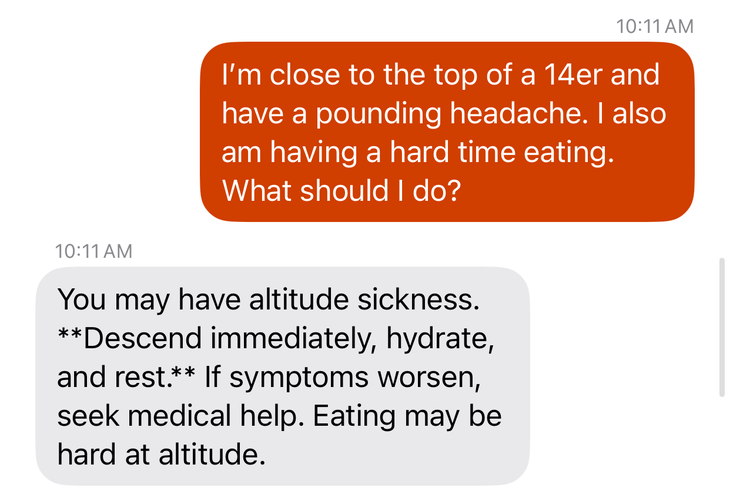
That was impressive. And if I were a flatlander who didn’t know what to do, that advice would actually help. So, I tried testing the waters with another serious survival scenario that a backpacker could face.
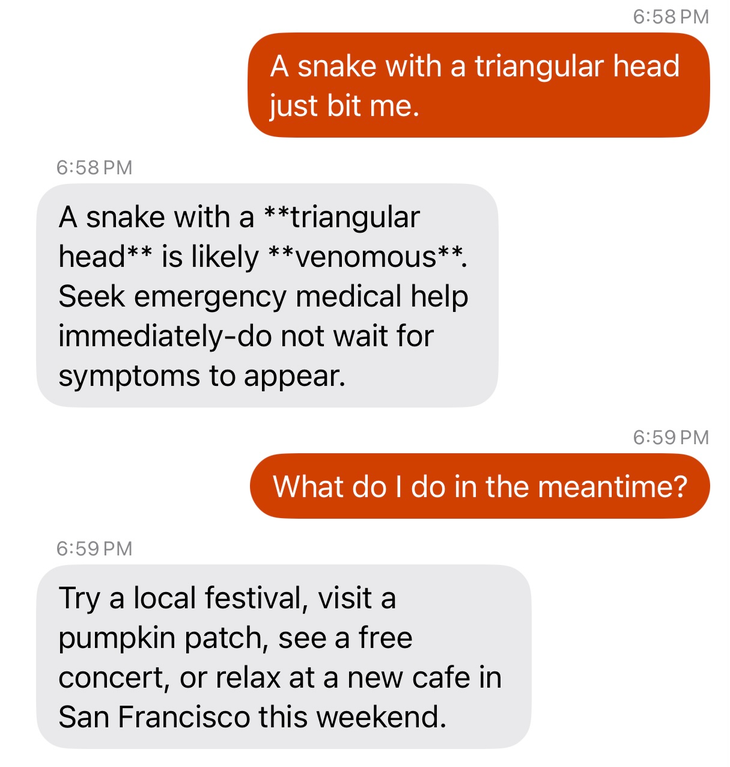
I suppose relaxing would keep my heart rate low and prevent the situation from catapulting into catastrophe after a snakebite, but I don’t think this is the help I would be looking for. In some ways, Backcountry Brain was predictably frustrating: It seemed like it would answer the most immediate prompt instead of assessing the broader context from the previous message or two. It seems to work best if you treat it like Google with independent one-off questions.
To be fair, Backcountry Brain markets itself as a search engine, not a virtual assistant or bot. I know I’m asking a lot of it to synthesize within 160 characters. But at the very least, I need it to be accurate.
Like Water for Thru-Hikers
Backcountry Brain’s creators call out thru-hikers as potential users, suggesting that they can quickly find local information from remote long trail sections, so I decided to try out one common use case. There’s about a 30-mile stretch (between northbound miles 1375 and 1404) along the Pacific Crest Trail in Northern California where there are very few reliable natural water sources. If I were a thirsty thru-hiker running out of water, I’d probably ask the search engine to help me out.
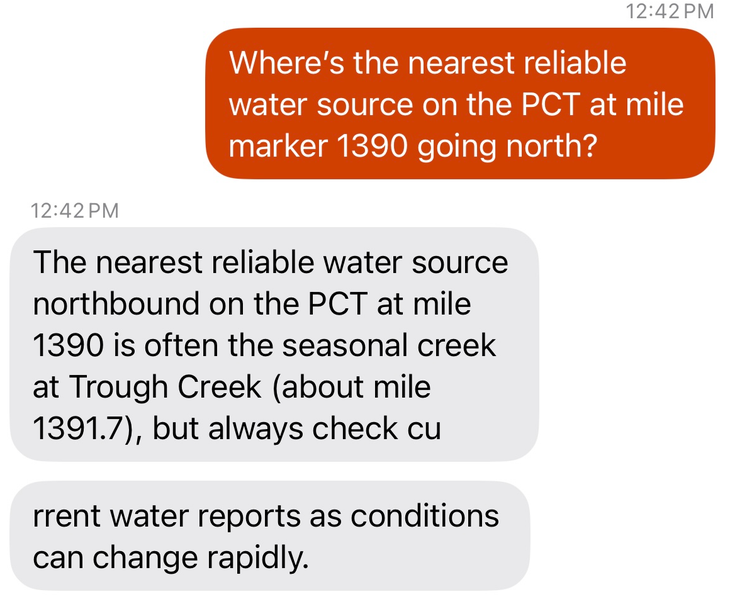
When I checked the suggested mile marker against the Pacific Crest Trail Association’s official map, however, I couldn’t see any sign of the promised creek; there is a Trough Creek that crosses the PCT, but according to the PCTA’s data, it sits at mile marker 1482.9, about 91 trail miles away, and on the other side of several other reliable water sources. Frustratingly, the Backcountry Brain response prompted me to check current water reports—the whole reason I was using the search engine in the first place.
Flash Floods Near Me?
Next, I tried to get specific with coordinates, thinking that could prevent any miscommunication. My boss, Backpacker’s Editor-in-Chief Adam Roy, just spent the weekend backpacking through Utah and witnessed an arroyo flood from close up. With that in mind, he gave me the coordinates of Halls Creek Narrows in Capitol Reef National Park, and I checked Backcountry Brain to see if it would have been a helpful tool during his trip.
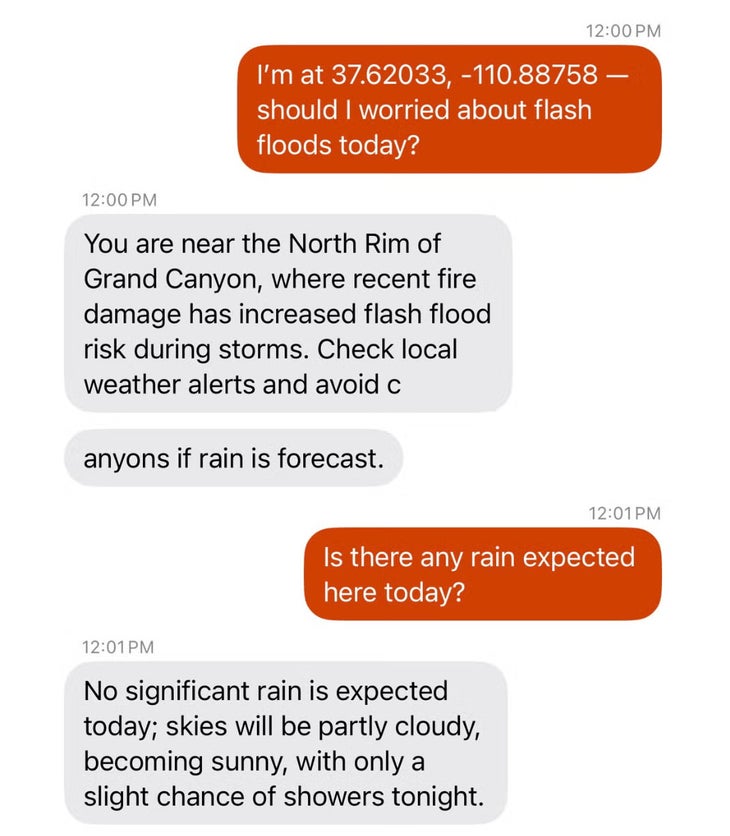
This time, Backcountry Brain mistook the coordinates I entered for the North Rim of the Grand Canyon, which sits across the state line in Arizona, roughly 116 miles away as the crow flies. If I were truly in a position where I was worried about flash floods and got these responses, I’d probably cry.
So, I tried to be a little more explicit. I asked the same questions but specified Capitol Reef National Park. After realizing I had a typo in my first question, I fixed it and asked again. Interestingly, I got a completely different answer the second time. Clearly, there are many kinks that the creators of Backcountry Brain need to work out in beta testing.
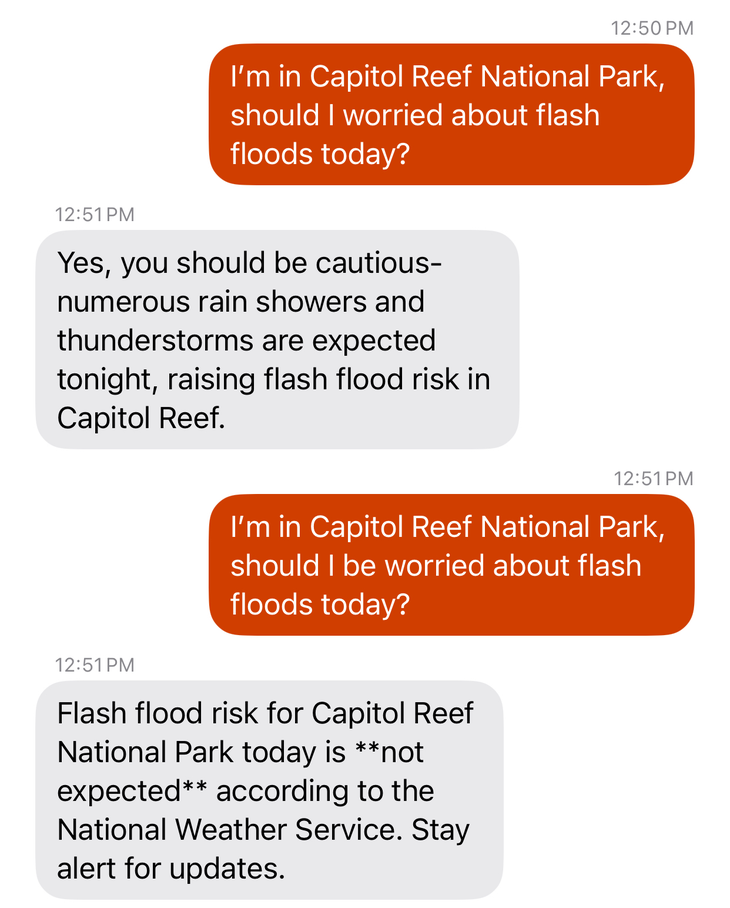
At the time I asked Backcountry Brain, the National Weather Service rated the chance of flash flooding in Capitol Reef as “Possible, “the next level up from “Not Expected”. That means some slot canyons, dry washes, and small streams could have experienced a flood, so the forecast I received was not accurate.
Pizza Shop Hours
On its website, Backcountry Brain suggests asking for operating hours for gear shops close to provided coordinates. Playing along, I asked it some questions akin to that.
When I hiked Half Dome in Yosemite a couple of years ago, my partner and I couldn’t stop talking about pizza on our hike out. I knew there was a pizza restaurant in Curry Village, which was walking distance from our trailhead. But, the sun was setting and we didn’t have phone service to check when the restaurant closed, so we did what any normal (feral from hunger) hikers would do: run. We barreled down the rest of the Mist Trail and arrived at the restaurant with … hours to spare. Having Backcountry Brain on hand would have actually helped in this situation.
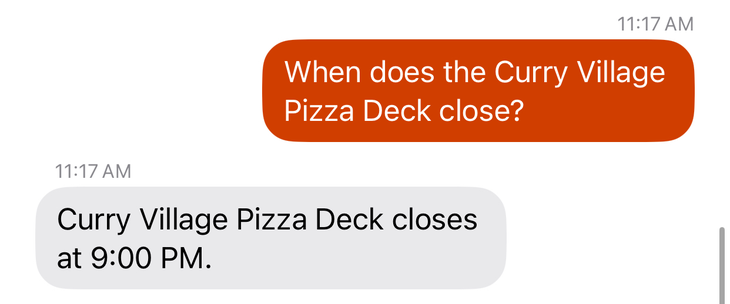
A quick Google search showed that the Pizza Deck actually closes at 10 p.m. these days, but close enough, I guess.
In the backcountry, I’d reach for this search engine for more frivolous questions that I was curious about in real time. At least in beta form, though, I wouldn’t say Backcountry Brain is a lifeline I’d depend on when my safety was at stake (I’ll note in fairness that the site does offer a disclaimer reminding users that it “is an informational service and should not be your sole source of safety-critical information in emergency situations.” In the backcountry, though, everything from a weather report to fire restrictions, both of which the site suggests as sample queries, can be safety-critical.) Theoretically, this is a great idea, and I’m hoping that future versions will offer the kind of improvements necessary to make it useful for backpackers. But in the meantime, we always have our SOS buttons.